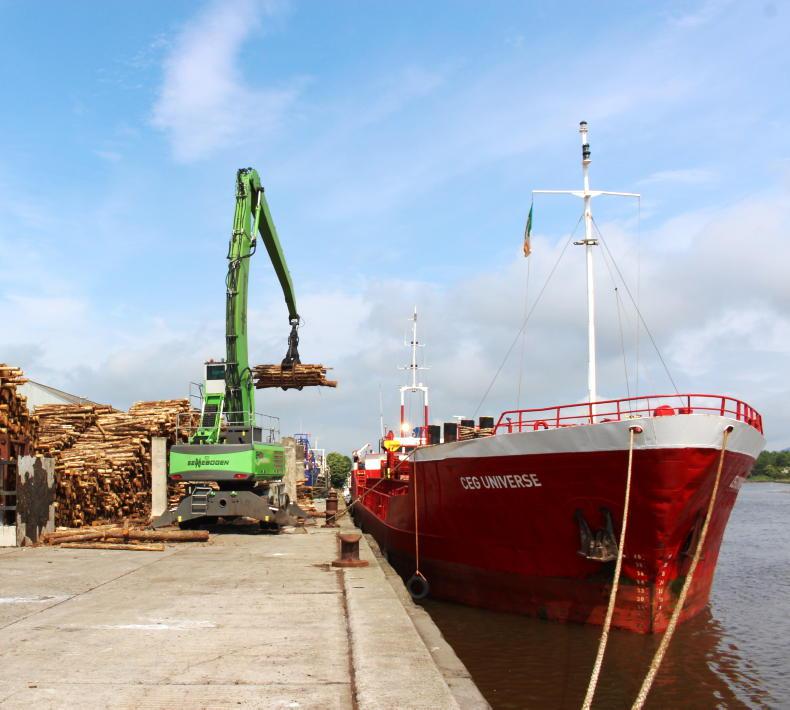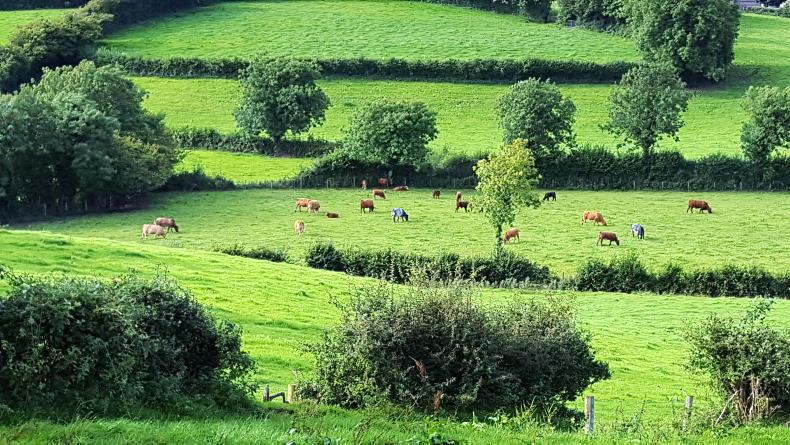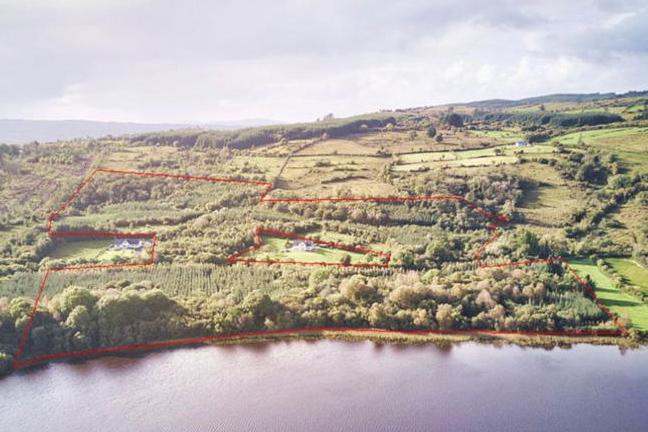Co Leitrim has become the epicentre for a heated debate on forestry, as concern grows about non-farming investors buying large swathes of land in the county.
The tax-free income forestry provides has always seemed like an attractive way for many self-employed farmers to provide themselves with a pension. But a new rule introduced in 2015 allowed non-farmers to plant land and receive forestry premiums.
This year, roughly 7,300 forest premium applications have been paid so far, amounting to €27.8m.
Local farmers say they are being outbid for land by forestry companies and people fear that the surge in planting will decimate rural communities.
Others, however, including MEP Mairead McGuinness, point out that overall, Ireland has the lowest level of forestry cover in Europe, with just 10% of available land planted.
The Environmental Protection Agency has reported that agriculture is the leading cause of carbon emissions in Ireland, and there is little doubt that the next CAP will be heavily focused on sustainability and carbon neutrality. Forestry has the potential to play a leading role in offsetting carbon production from the livestock sector.
On the back of this, Midlands-Northwest MEP Marian Harkin said: “The prospect that Ireland faces substantial EU fines for failure to meet emissions targets has further encouraged policies which incentivise blanket forestry with little diversity of species,” .
The Government has been encouraging the planting of land, especially marginal land across western and northwestern counties for a number of years. Tax-free premia can be an attractive offer for farmers working with challenging land types.
Listen to local resident Edwina Guckian in our podcast below:
The average size of a farm in Leitrim is 25ha and forestry companies such as Veon claim potential customers can earn up to €14,000 per year in premia for planting conifers. In comparison, the annual Teagasc’s Review and Outlook for farm incomes showed that suckler farmers lost €16/ha before direct payments, while beef finishers lost €3/ha excluding direct payments. The net margin for the average lowland lamb enterprise is predicted to fall by 20% to €224/ha.
As a county which already has the lowest population in the country, Leitrim is particularly vulnerable to rural population issues, as highlighted by Pat Gilhooley, vice-chair of the IFA’s rural development committee: “The Government maintains that the national forestry planting in the county is only at 11%, but Leitrim is the next highest plantation to Wicklow.
“The problem is that Wicklow is closer to Dublin and people can commute to work in the city. But here it’s having a huge effect on rural communities, on the local schools and community life, because when the land is gone, the people aren’t staying.
“The football clubs in each parish have a job now to get players because they aren’t there. The sad part is at the underage level there could be three parishes amalgamated to put out an underage team,” said Gilhooley. “The numbers in rural areas are going down and even the small towns and villages are under tremendous pressure because there aren’t any jobs, and we need jobs for part-time farmers.
“All farmers can’t go into dairying and farmers who have sucklers and sheep are under pressure to make a living. I’m not against a farmer planting his own land and a man is entitled to sell his land at the going rate, but the Government needs to bring in a suckler cow scheme and some kind of long-term, low-interest loan scheme to help farmers.”
Forestry: what’s been said
“The headlong determination of Irish forestry authorities to disproportionately plant Co Leitrim and not to adhere to EU objectives in all parts of Ireland reveals an arrogance which must not be accepted.”
- Marian Harkin, Midlands-Northwest Independent MEP
“Trees are a farming enterprise, not an anti-farming activity, with environmental and sustainability benefits for the community, but community concerns need to be heard.”
- Mairead McGuinness, vice-president of the European Parliament and Fine Gael Midlands-Northwest MEP.
“The beginning of each year is a good time to consider options for the year ahead and I would encourage landowners to give serious consideration to forestry as a land use option.”
- Andrew Doyle, minister of state at the Department of Agriculture, Food and the Marine with responsibility for Forestry.
Read more
‘Sitka spruce is just tall green desert’
‘Trying to farm bad land is a waste of time’
Co Leitrim has become the epicentre for a heated debate on forestry, as concern grows about non-farming investors buying large swathes of land in the county.
The tax-free income forestry provides has always seemed like an attractive way for many self-employed farmers to provide themselves with a pension. But a new rule introduced in 2015 allowed non-farmers to plant land and receive forestry premiums.
This year, roughly 7,300 forest premium applications have been paid so far, amounting to €27.8m.
Local farmers say they are being outbid for land by forestry companies and people fear that the surge in planting will decimate rural communities.
Others, however, including MEP Mairead McGuinness, point out that overall, Ireland has the lowest level of forestry cover in Europe, with just 10% of available land planted.
The Environmental Protection Agency has reported that agriculture is the leading cause of carbon emissions in Ireland, and there is little doubt that the next CAP will be heavily focused on sustainability and carbon neutrality. Forestry has the potential to play a leading role in offsetting carbon production from the livestock sector.
On the back of this, Midlands-Northwest MEP Marian Harkin said: “The prospect that Ireland faces substantial EU fines for failure to meet emissions targets has further encouraged policies which incentivise blanket forestry with little diversity of species,” .
The Government has been encouraging the planting of land, especially marginal land across western and northwestern counties for a number of years. Tax-free premia can be an attractive offer for farmers working with challenging land types.
Listen to local resident Edwina Guckian in our podcast below:
The average size of a farm in Leitrim is 25ha and forestry companies such as Veon claim potential customers can earn up to €14,000 per year in premia for planting conifers. In comparison, the annual Teagasc’s Review and Outlook for farm incomes showed that suckler farmers lost €16/ha before direct payments, while beef finishers lost €3/ha excluding direct payments. The net margin for the average lowland lamb enterprise is predicted to fall by 20% to €224/ha.
As a county which already has the lowest population in the country, Leitrim is particularly vulnerable to rural population issues, as highlighted by Pat Gilhooley, vice-chair of the IFA’s rural development committee: “The Government maintains that the national forestry planting in the county is only at 11%, but Leitrim is the next highest plantation to Wicklow.
“The problem is that Wicklow is closer to Dublin and people can commute to work in the city. But here it’s having a huge effect on rural communities, on the local schools and community life, because when the land is gone, the people aren’t staying.
“The football clubs in each parish have a job now to get players because they aren’t there. The sad part is at the underage level there could be three parishes amalgamated to put out an underage team,” said Gilhooley. “The numbers in rural areas are going down and even the small towns and villages are under tremendous pressure because there aren’t any jobs, and we need jobs for part-time farmers.
“All farmers can’t go into dairying and farmers who have sucklers and sheep are under pressure to make a living. I’m not against a farmer planting his own land and a man is entitled to sell his land at the going rate, but the Government needs to bring in a suckler cow scheme and some kind of long-term, low-interest loan scheme to help farmers.”
Forestry: what’s been said
“The headlong determination of Irish forestry authorities to disproportionately plant Co Leitrim and not to adhere to EU objectives in all parts of Ireland reveals an arrogance which must not be accepted.”
- Marian Harkin, Midlands-Northwest Independent MEP
“Trees are a farming enterprise, not an anti-farming activity, with environmental and sustainability benefits for the community, but community concerns need to be heard.”
- Mairead McGuinness, vice-president of the European Parliament and Fine Gael Midlands-Northwest MEP.
“The beginning of each year is a good time to consider options for the year ahead and I would encourage landowners to give serious consideration to forestry as a land use option.”
- Andrew Doyle, minister of state at the Department of Agriculture, Food and the Marine with responsibility for Forestry.
Read more
‘Sitka spruce is just tall green desert’
‘Trying to farm bad land is a waste of time’











SHARING OPTIONS